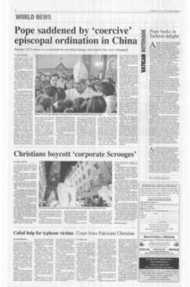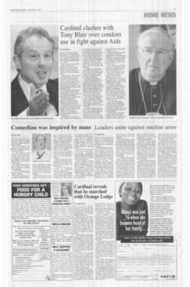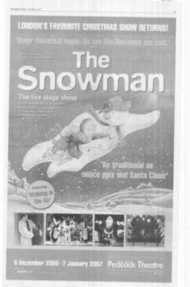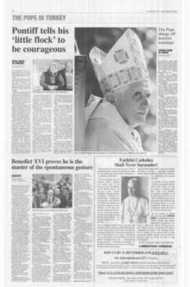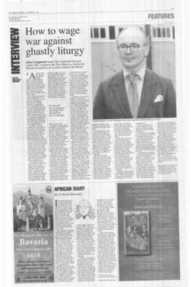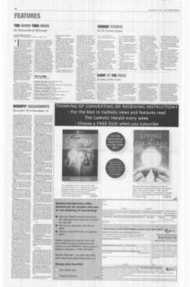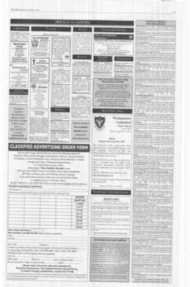Page 4, 8th December 2006
Page 4

Report an error
Noticed an error on this page?If you've noticed an error in this article please click here to report it.
Tags
Share
Related articles
Small Steps Towards Unity
Can Our Theologian-pope Heal The Great Schism?
In Brief
The Pope Flies Into The Lion's Den
Orthodox Relations Reach 'crucial Point'
Visit raises hopes of end to East-West schism
In a historic meeting Benedict XVI and Bartholomew I confess sorrow over continuing divisions between Catholics and Orthodox believers
MEETING WITH THE PATRIARCH
BY STAFF REPORTER
CLAIMING the brotherhood of their respective patron saints — the Apostles Andrew and Peter — the spiritual leaders of the world's Orthodox and the world's Catholics have joined together in prayer and solemnly affirmed their commitment to the full unity of their Churches.
Incense and ancient hymns chanted in Greek set the atmosphere as Pope Benedict XVI paid homage to the Orthodox Church by attending a November 30 Divine Liturgy celebrated by
Ecumenical Patriarch Bartholomew of Constantinople.
The liturgy at the Orthodox Church of St George in Istanbul marked the feast of St Andrew, patron of the patriarchate.
The Pope and Patriarch greeted each other with kisses on the cheek, but then the Pope moved to a raised wooden throne at the side of the church while the patriarch celebrated the solemn liturgy.
After the almost three-hour liturgy Patriarch Bartholomew led Pope Benedict to a balcony overlooking a courtyard.
They both blessed the crowd, then the patriarch took the Pope's hand and held it aloft as they waved and smiled at the applauding crowd below.
"In the liturgy, we are reminded of the need to reach unity in faith as well as in prayer," the Patriarch said in his homily.
"Therefore, we kneel in humility and repentance before the living God and Our Lord Jesus Christ, whose precious name we bear and yet at the same time whose seamless garment we have divided," the Patriarch told the Pope and other members of the congregation.
"We confess in sorrow that we are not yet able to celebrate the holy sacraments in unity," Patriarch Bartholomew said.
"And we pray that the day may come when this sacramental unity will be realised in its fullness."
As the Orthodox faithful processed up for Communion, they bowed to the Pope before receiving the consecrated bread and wine.
But one little boy, dressed in a dark suit and tie, stepped out of the line to kiss the Pope's ring.
Although the Orthodox Church in Turkey has fewer than 5,000 members, Pope Benedict told reporters that the Patriarchate's standing in the Orthodox world as the "first among equals" made a visit almost obligatory.
"Numbers, quantity, do not count," the Pope told reporters on November 28 on the way to Turkey. "It is the symbolic, historical and spiritual weight that counts" and the fact that the patriarchate "remains a point of reference for the whole Orthodox world and, therefore, for all of Christianity".
Addressing the congregation at the end of the liturgy Pope Benedict said the service was an opportunity "to experience once again the communion and call of the two brothers", Peter and Andrew, chosen by Jesus to be his apostles and sent to different cities to preach the same Gospel.
The fact that the brothers also had different roles within the Christian community, with Peter and his successors in Rome having a "universal responsibility", has "unfortunately given rise to our differences of opinion, which we hope to over
come, thanks also to the theological dialogue which has been recently resumed," Pope Benedict said.
While the Orthodox generally recognise the importance of the Church of Rome, they object to the way in which popes have tried to exercise direct jurisdiction over all Christian communities.
Pope Benedict said he wanted to "recall and renew" the invitation issued by Pope John Paul II for a discussion among Christians on possible ways for exercising the papal ministry to serve the unity of all Christians.
"It is only through brotherly communion between Christians and through their mutual love that the message of God's love for each and every man and woman will become credible," the Pope said.
Like the Patriarch, he expressed his sadness at the fact that although they share the same faith and recognise the validity of each other's sacraments, Catholics and Orthodox cannot regularly share each other's Eucharist.
"May our daily prayer and activity be inspired by a fervent desire not only to be present at the Divine Liturgy, but to be able to celebrate it together, to take part in the one table of the Lord, sharing the same bread and the same chalice," the Pope said.
At the end of the liturgy he gave Patriarch Bartholomew a chalice as a gift.
The Patriarch, in turn, gave the Pope a book of the Gospels, expressing his hope that Catholics and Orthodox would be imitators of Christ and would allow love, unity and peace to prevail.
After the liturgy, the Pope and Patriarch signed a joint declaration committing their Churches to continuing theological dialogue and greater practical cooperation, especially in promoting Christian values in increasingly secularised societies.
They also expressed their concern for the poor and for victims of violence — especially in the Middle East and terrorism and those whose religious freedom is not recognised fully.
The Pope's encounter with the Patriarch began with an evening prayer service in Istanbul on November 29 opened two days of richly symbolic events and brought an ecumenical focus to the Pope's four-day visit to Turkey.
Patriarch Bartholomew, who is honoured as the "first among equals" in the Orthodox world, greeted the Pope at the Istanbul airport and met him again shortly afterward on the steps of the Patriarchate's headquarters, where dozens of Orthodox prelates were waiting in the Church of St George.
The Pope and Patriarch lit votive candles and, as applause rang out, walked up the centre aisle, their path clouded with incense. A choir chanted antiphons commemorating Ss Peter and Paul, the patron saints of Rome, and St Andrew, the patron of the patriarchal see of Constantinople, the ancient name of Istanbul.
The Pope, wearing a red cape against the chill, looked good after a day that took him from the capital city of Ankara to the ancient site of Ephesus for a Mass, and finally to Istanbul.
The Pope and Patriarch listened to a reading of the prophet Zechariah, calling the peoples of East and West to assemble again in Jerusalem. After praying the
Our Father, they each gave short talks.
The Pope spoke of the ancient Christian roots of the region and cited "the rich harvest of martyrs, theologians, pastors, monastics, and holy men and women which those Churches brought forth over the centuries".
He also recalled the ecumenical milestones of recent years, including the decision of both Churches in 1965 to lift the excommunications exchanged in 1054 which marked the beginning of the East-West schism.
At that time, the Pope said, Pope Paul VI and Patriarch Athenagoras announced their ecumenical breakthrough in a "spirit of rediscovered love".
"It is on this foundation of mutual love that new relations between the Churches of Rome and Constantinople have developed," he said. The signs of that love, he said, include visits of Popes Paul and John Paul II, in 1967 and 1979, respectively, to the ecumenical patriarchate.
Patriarch Bartholomew also recalled the visits of previous popes, saying these men understood the "inestimable value and urgent need" of such encounters.
"We are deeply grateful to God that Your Holiness has taken similar steps today in the same spirit," the Patriarch said.
The Pope and Patriarch stopped briefly to venerate the relics of St Gregory Nazianzen and St John Chrysostom, both former patriarchs of Constantinople. Pope John Paul returned a portion of the relics to Patriarch Bartholomew in 2004; they were believed stolen from Constantinople during the Crusades in 1204.
blog comments powered by Disqus



